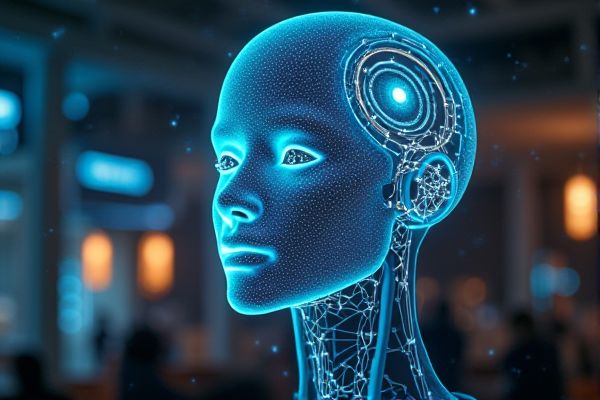
AI in tourism enhances customer experiences through personalized recommendations based on user preferences and behaviors. Chatbots improve customer service by providing instant responses to inquiries, helping travelers with bookings, and offering real-time assistance during their trips. Data analysis enables businesses to understand trends in tourist behavior, optimizing pricing strategies and marketing efforts. Predictive analytics helps in managing resources effectively by forecasting visitor numbers and adjusting services accordingly.
AI usage in tourism and hospitality
Predictive Analytics
AI usage in tourism and hospitality can enhance customer experience through predictive analytics. This technology allows companies to anticipate traveler preferences and behaviors, leading to tailored services. For example, hotels can use predictive models to optimize pricing strategies based on seasonal trends and booking patterns. The advantage lies in maximizing occupancy rates and improving guest satisfaction through personalized offerings.
Personalized Travel Experience
AI can enhance personalized travel experiences by analyzing customer preferences and behaviors. For instance, platforms like Airbnb use machine learning algorithms to recommend accommodations tailored to individual tastes. This approach can increase customer satisfaction and encourage repeat bookings. The ability to provide customized itineraries may also attract a diverse range of travelers seeking unique experiences.
Chatbots and Virtual Assistants
The implementation of AI in tourism and hospitality can enhance customer service through chatbots and virtual assistants that provide instant support. For instance, a hotel may utilize a virtual assistant to streamline the booking process, offering personalized recommendations and answering common inquiries. This can lead to improved guest satisfaction and increased efficiency for staff. The potential for AI-driven solutions to analyze customer preferences could further tailor experiences, enhancing loyalty and repeat visits.
Demand Forecasting
AI can enhance demand forecasting in the tourism and hospitality sector by analyzing historical booking data and current market trends. For instance, a hotel chain like Marriott may implement AI algorithms to predict occupancy rates and optimize pricing strategies. This predictive capability can lead to improved inventory management and better resource allocation, ultimately maximizing profitability. By leveraging AI-driven demand forecasts, businesses can ensure they meet customer needs while minimizing operational costs.
Smart Pricing Strategies
AI can analyze vast amounts of data to identify pricing trends and optimize room rates in the hospitality sector. Hotels can leverage AI-driven smart pricing strategies to adjust prices dynamically based on demand, seasonality, and competitor rates. For instance, hotel chains like Marriott can utilize these algorithms to maximize revenue while remaining competitive in the market. This approach enhances customer satisfaction by offering appropriate pricing tailored to individual preferences and booking behaviors.
Customer Service Automation
AI in tourism and hospitality can enhance customer experience by providing personalized recommendations. For instance, hotels like Marriott have started utilizing chatbots for customer service automation, streamlining booking processes. This technology allows for efficient handling of inquiries, freeing up staff for more complex tasks. The integration of AI could lead to improved customer satisfaction and potentially higher occupancy rates.
Augmented Reality Tours
Augmented reality (AR) tours can enhance the visitor experience in tourism and hospitality by providing immersive, interactive elements that traditional tours lack. For example, a hotel like Marriott might use AR to offer guests virtual walkthroughs of nearby attractions, enriching their stay. This technology creates opportunities for businesses to differentiate themselves in a competitive market by offering unique experiences. Tour operators could leverage AR to showcase destinations in a more engaging way, potentially increasing customer satisfaction and loyalty.
Recommendation Engines
AI-powered recommendation engines in tourism and hospitality enhance personalized experiences for travelers. By analyzing user preferences and past behavior, these systems can suggest tailored itineraries or accommodations, increasing customer satisfaction. For example, a hotel may use such a system to offer guests recommendations for local attractions or dining options based on their interests. This personalization can lead to higher booking rates and repeat clientele for businesses in the sector.
Language Translation Tools
AI usage in tourism and hospitality has the potential to enhance customer experiences through personalized recommendations and efficient service delivery. Language translation tools can bridge communication gaps between travelers and service providers, facilitating smoother interactions. This technology may allow hotels, such as Marriott, to cater to diverse international guests effectively. The possibility of increased customer satisfaction and loyalty creates a significant advantage for businesses in this sector.
Sentiment Analysis and Feedback
AI can enhance tourism and hospitality by analyzing customer sentiment through feedback platforms. Tools like natural language processing can evaluate reviews on sites such as TripAdvisor, providing insights into guest experiences. This information allows businesses to tailor their services to meet customer expectations more effectively. The potential for improved guest satisfaction can lead to higher ratings and increased loyalty for brands.
 techknowy.com
techknowy.com